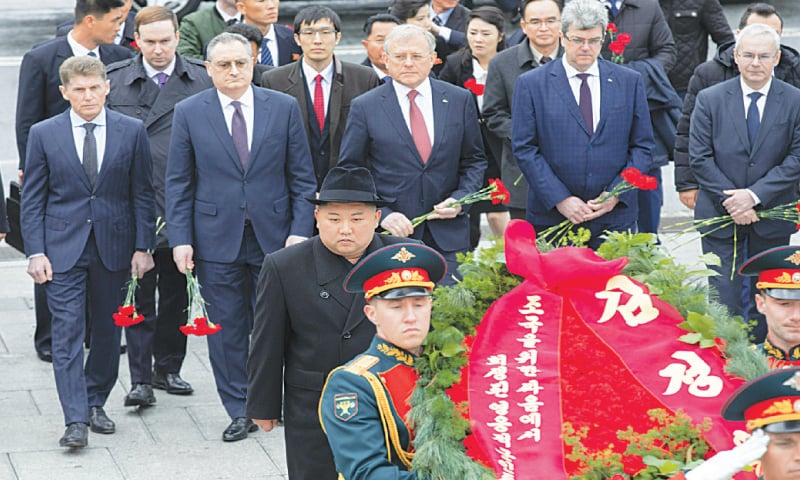SEOUL: North Korean leader Kim Jong Un said during his summit with Russian President Vladimir Putin that peace and security on the Korean peninsula depend entirely on the future US attitude, North Korean state media KCNA said on Friday.
Kim’s remarks were seen as keeping pressure on the United States to be more flexible in accepting Pyongyang’s demands to ease sanctions, compared to the US stance during his unsuccessful second summit with US President Donald Trump in Hanoi in February.
The North Korean leader said at the time he would wait until the end of the year for the United States to become more flexible.
Says North Korea will gird itself for any eventuality
“The situation on the Korean peninsula and the region is now at a standstill and has reached a critical point where it may return to its original state as the US took a unilateral attitude in bad faith at the recent second DPRK-US summit talks,” KCNA reported Mr Kim as saying, using North Korea’s official name, the Democratic People’s Republic of Korea.
“The DPRK will gird itself for every possible situation.” Mr Kim said.
Mr Kim invited Mr Putin to North Korea at a convenient time and Mr Putin accepted, KCNA said.
There was no immediate comment on the summit from the US State Department but William Hagerty, the US ambassador to Japan, told a Washington think-tank Kim’s contact with Russia and China was part of an effort to seek relief from international sanctions.
“The fact you see Kim Jong Un meeting with Vladimir Putin underscores the fact that the sanctions are working and the sanctions are putting extreme economic pressure on the North Korean regime,” Mr Hagerty said.
“What we see is an outreach to try to find a way to deal with it. There is a much simpler way to deal with it and that is to denuclearise,” he said.
He said it was important the international community enforced UN sanctions against North Korea that were imposed because of Pyongyang’s nuclear and missile programmes.
The first face-to-face talks between Mr Putin and Mr Kim, held on an island off the Russian Pacific city of Vladivostok on Thursday, did not appear to yield any major breakthrough.
The two leaders had an in-depth discussion on ways for their countries to promote strategic communication and tactical collaboration in the course of ensuring peace and security on the Korean peninsula and in the region, the KCNA said.
Mr Putin said he thought a deal on Pyongyang’s nuclear programme was possible and that the way to get there was to move forward step by step in order to build trust.
But any US guarantees might need to be supported by the other nations involved in previous six-way talks on the nuclear issue, Mr Putin said, which was seen as a way to use the summit to strengthen Russia’s diplomatic clout as a global player.
Russia and North Korea agreed to take measures to further cooperate in trade, economy, science and technology, the KCNA said.
Published in Dawn, April 27th, 2019















































